Letter Of Intent To Retire
[Your Name]
[Your Address]
[City, State, Zip Code]
[Email Address]
[Phone Number]
[Today's Date]
[Employer's Name]
[Company Name]
[Company Address]
[City, State, Zip Code]
Dear [Employer's Name],
I hope this letter finds you well. After much contemplation and careful consideration, I am writing to formally announce my intention to retire from my position at [Company Name]. It is with mixed emotions that I make this decision, as I have cherished the time I have spent here and the opportunities I have been given.
My last day of active employment will be [Last Working Day], providing sufficient notice to ensure a smooth transition for my team and the company as a whole. I am committed to assisting in the transition process and will be more than willing to help train my replacement, share knowledge, and complete any pending projects or tasks to the best of my ability before my departure.
Throughout my tenure at [Company Name], I have had the privilege of working alongside exceptional colleagues and have had the support of inspiring leaders. The experiences and memories I have gathered during my time here will be forever treasured, and I am truly grateful for the camaraderie and support I have received from all levels of the organization.
As I prepare to enter this new phase of my life, I want to express my heartfelt gratitude to [Company Name] for providing me with a fulfilling and rewarding career. The opportunities for professional growth and personal development have been invaluable, and I will carry the lessons learned with me as I embark on this new journey of retirement.
In the coming weeks, I am more than willing to meet with you or any designated representative to discuss the transition process and how I can be of assistance during this period. Moreover, I am open to providing any necessary information required for the continuation of projects I have been involved in.
Once again, I would like to extend my sincerest appreciation to [Company Name] for being an integral part of my life and career. I look forward to witnessing the continued success and prosperity of the company from a different vantage point.
Thank you for your understanding and support throughout this process. I eagerly anticipate a smooth and seamless transition and wish nothing but the best for [Company Name] and all my colleagues in the future.
Sincerely,
[Your Name]
Professional Letter of Intent to Retire
Subject: Notice of Intent to Retire
Dear [Manager’s Name],
I am writing to formally notify you of my intent to retire from my position as [Your Position] at [Company Name], effective [Retirement Date]. This decision has been carefully considered, and I want to ensure a smooth transition for my responsibilities.
I am willing to assist in the handover process and provide guidance to my successor to maintain continuity. I extend my gratitude for the support and opportunities I have received during my tenure.
Sincerely,
[Your Name]
Heartfelt and Personal Letter of Intent to Retire
Subject: Sharing My Retirement Plans
Dear [Manager’s Name],
After much thought, I have decided to retire from my role as [Your Position] at [Company Name], effective [Retirement Date]. My time here has been truly rewarding, and I will cherish the relationships and experiences gained over the years.
I look forward to assisting in any way possible during the transition period. Thank you for your mentorship, guidance, and encouragement throughout my career.
Warm regards,
[Your Name]
Quick and Simple Letter of Intent to Retire
Subject: Intent to Retire
Dear [Manager’s Name],
I am writing to inform you of my intention to retire from my position as [Your Position], effective [Retirement Date]. I will work to ensure a smooth transition during my remaining time.
Thank you,
[Your Name]
Formal Official Retirement Notice Letter
Subject: Official Notice of Retirement
Dear [Manager’s Name],
This letter serves as my formal notice of retirement from the position of [Your Position] at [Company Name], effective [Retirement Date]. I am committed to completing all pending tasks and supporting a seamless transition.
I extend my sincere gratitude for the support and professional development opportunities provided during my tenure.
Respectfully,
[Your Name]
Preliminary Retirement Notice Email
Subject: Preliminary Notice of Retirement
Dear [Manager’s Name],
I wish to inform you preliminarily that I am planning to retire from my role as [Your Position] at [Company Name], tentatively effective [Retirement Date]. I wanted to share this early so we can plan for a smooth transition.
Thank you for your understanding and support.
Best regards,
[Your Name]
What is a Letter of Intent to Retire and Why You Need It
A Letter of Intent to Retire is a formal notification from an employee indicating their plan to leave their position due to retirement.
Its purpose includes:
- Providing official notice to the employer
- Allowing time for succession planning
- Ensuring a smooth handover of responsibilities
- Documenting retirement plans for HR and legal purposes
Who Should Send a Letter of Intent to Retire
- Employees planning to retire from their current position
- Senior professionals and executives requiring formal communication to management
- Individuals nearing retirement age or completing long-term service
Whom Should the Letter Be Addressed To
- Immediate supervisors or department managers
- Human Resources department for record-keeping
- Optionally, company executives or board members if required by organizational policy
When Should You Send a Letter of Intent to Retire
- At least 1–3 months prior to the intended retirement date
- Upon reaching the legal or contractual retirement age
- When personal circumstances necessitate early planning or phased retirement
- Prior to official exit processing or retirement benefits planning
How to Write and Send a Letter of Intent to Retire
- Start with a clear subject line stating intent to retire.
- Address the letter to your direct manager or HR.
- Clearly state your position and the effective retirement date.
- Express willingness to assist with transition and handover.
- Offer gratitude for professional development and opportunities.
- Sign the letter formally, including contact information for follow-up.
- Send as a printed letter for official records or email for convenience.
Requirements and Preparations Before Writing
- Confirm your intended retirement date and company retirement policies
- Gather information about pending projects and responsibilities
- Review benefits, pension, and retirement entitlements
- Decide on the tone of the letter: formal, personal, or casual depending on company culture
- Identify people or successors to assist during your transition
Formatting Guidelines for a Retirement Letter
- Length: 150–250 words is sufficient
- Tone: Professional, respectful, and optionally heartfelt
- Wording: Clear, concise, and unambiguous
- Style: Formal for official records, casual or personal for team communication
- Mode: Printed letter for HR or email for early notice
After Sending the Letter of Intent to Retire
- Confirm receipt with HR or your manager
- Participate in exit interviews or retirement planning meetings
- Assist in training or handing over responsibilities to your successor
- Maintain copies for personal records and benefit processing
Common Mistakes to Avoid
- Not specifying the effective retirement date
- Failing to notify HR or relevant management
- Being overly casual or ambiguous in tone
- Neglecting to mention transition assistance or handover plans
- Waiting too long to give notice
Key Elements and Structure of a Letter of Intent to Retire
- Subject or Title
- Greeting
- Statement of intent to retire and position held
- Effective retirement date
- Willingness to assist in transition
- Expression of gratitude
- Closing and signature
- Optional: Contact information for follow-up or questions
Tricks and Tips for an Effective Retirement Letter
- Use clear and respectful language
- Provide sufficient notice to allow smooth transition
- Personalize the letter to reflect your experiences and gratitude
- Keep a professional tone even if it is heartfelt
- Retain copies for future reference and benefit claims
Pros and Cons of Sending a Retirement Letter
Pros:
- Provides official documentation for HR and management
- Allows organized succession planning
- Demonstrates professionalism and respect
- Facilitates smooth transition
Cons:
- May trigger immediate administrative actions before you are ready
- Could initiate discussions about early retirement benefits or negotiations that need careful handling
Compare and Contrast: Retirement Letter vs Resignation Letter
- A retirement letter is specifically for ending employment due to age or service completion, whereas a resignation letter can be for any reason.
- Both require notice and formal communication, but retirement letters often involve additional steps like pension planning and exit formalities.
- Resignation may be immediate or negotiated, while retirement is generally planned in advance.

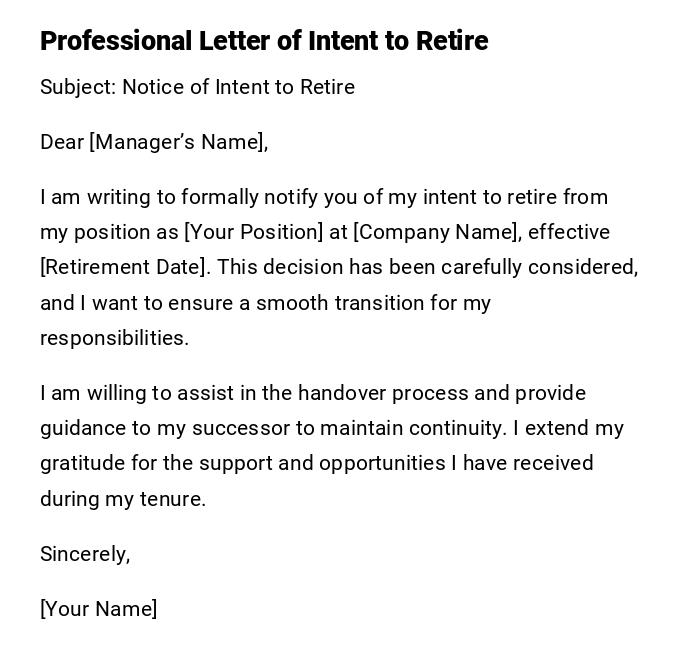
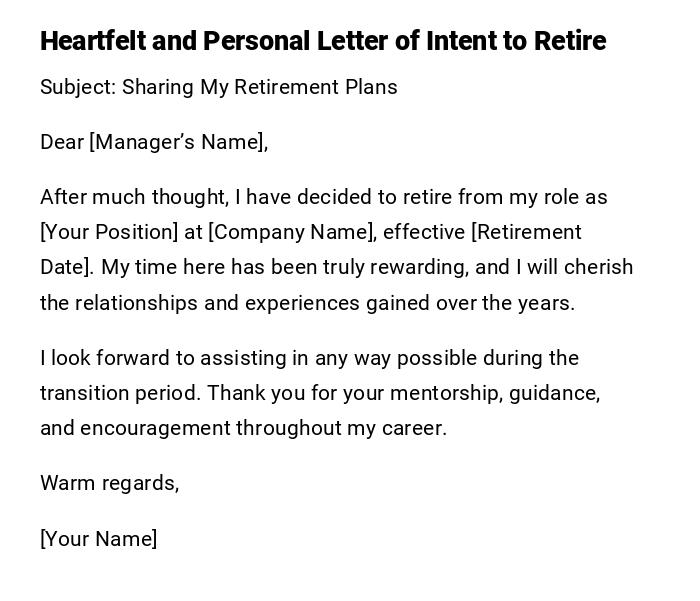
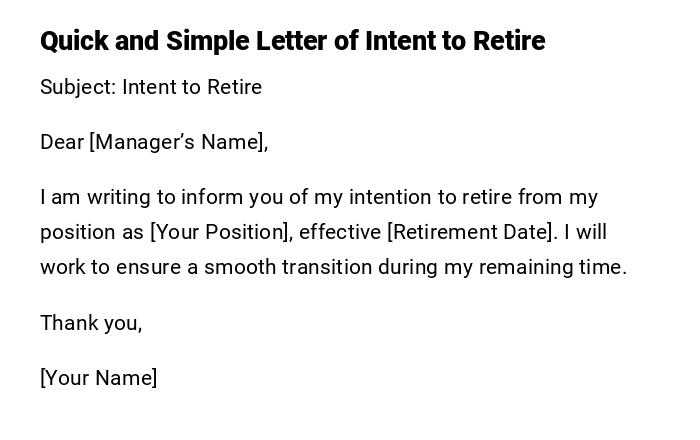
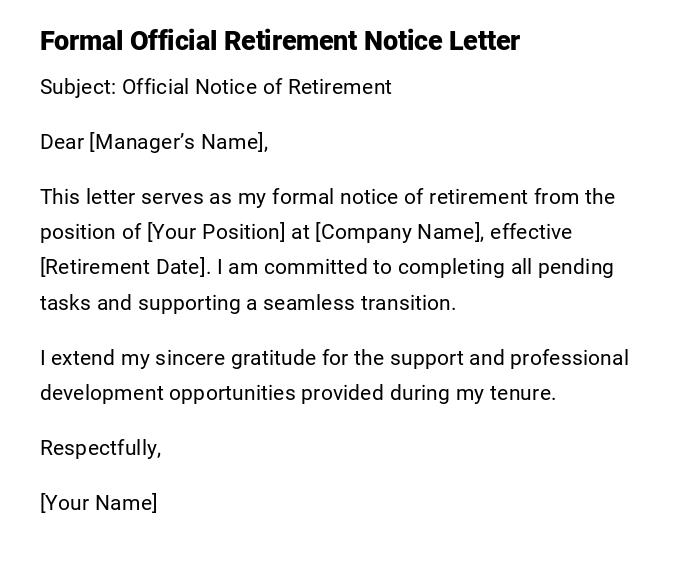
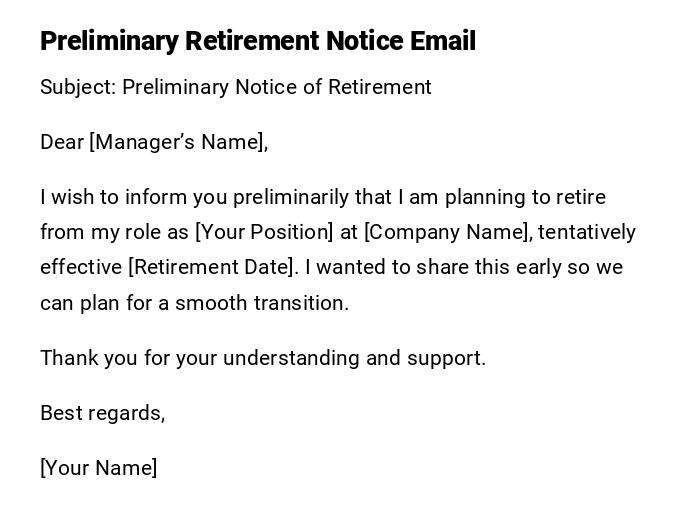

 Download Word Doc
Download Word Doc
 Download PDF
Download PDF